九年级英语第九单元知识点
- 格式:doc
- 大小:28.00 KB
- 文档页数:2
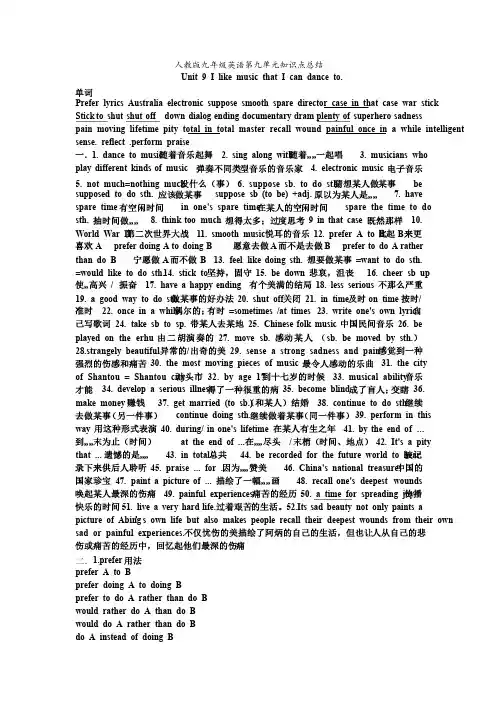
人教版九年级英语第九单元知识点总结Unit 9 I like music that I can dance to. 单词 Prefer lyrics Australia electronic suppose smooth spare director case in that case war stick Stick to to shut shut shut off down down dialog dialog ending documentary dram plenty of of superhero superhero sadness pain moving lifetime pity total in total master recall wound painful once in a while intelligent sense. reflect .perform praise 一.1. dance to music 随着音乐起舞 2. sing along with 随着……一起唱 3. musicians who play play different different kinds kinds of of music music 弹奏不同类型音乐的音乐家 4. 4. electronic electronic music music 电子音乐 5. not much=nothing much 没什么(事) 6. suppose sb. to do sth. 猜想某人做某事 be supposed supposed to to do do sth. sth. 应该做某事 suppose suppose sb sb (to (to be) be) +adj. +adj. 原以为某人是…… 7. 7. have have spare time 有空闲时间 in one's spare time 在某人的空闲时间 spare the time to do sth. 抽时间做…… 8. 8. think think too too much much 想得太多;过度思考 9 9 in in that that case case 既然那样 10. World War II 第二次世界大战 11. smooth music 悦耳的音乐 12. prefer A to B 比起B 来更喜欢A prefer doing A to to doing doing B 愿意去做A 而不是去做B prefer to to do do A A rather than than do do B B 宁愿做A 而不做B 13. 13. feel feel like like doing doing sth. sth. 想要做某事 =want =want to to do do sth. sth. =would like to do sth. 14. stick to 坚持,固守 15. be down 悲哀,沮丧 16. cheer sb up 使…高兴/ 振奋 17. 17. have have a a happy happy ending 有个美满的结局 18. 18. less less serious serious 不那么严重 19. a good way to do sth. 做某事的好办法 20. shut off 关闭 21. in time 及时on time 按时/准时 22. once in a while 偶尔的;有时 =sometimes /at times 23. write one's own lyrics 自己写歌词24. 24. take take sb sb to to sp. sp. 带某人去某地 25. 25. Chinese Chinese folk folk music music 中国民间音乐 26. 26. be be played played on on the the erhu 由二胡演奏的 27. 27. move move sb. sb. 感动某人 (sb. sb. be be moved moved by by sth.sth.) 28.strangely beautiful 异常的/出奇的美 29. sense a strong sadness and pain 感觉到一种强烈的伤感和痛苦 30. the most moving pieces of music 最令人感动的乐曲 31. the city of Shantou = Shantou city 汕头市 32. by age 17 到十七岁的时候 33. musical ability 音乐才能 34. develop a serious illness 得了一种很重的病 35. become blind 成了盲人;变瞎 36. make money 赚钱 37. get married (to sb.) (和某人)结婚 38. continue to do sth. 继续去做某事(另一件事) continue doing sth. 继续继续做着某事(同一件事) 39. perform in this way 用这种形式表演 40. 40. during/ during/ in in one's one's lifetime lifetime 在某人有生之年 41. 41. by by the the end end of ... of ... 到……末为止(时间) at the end of ... 在……尽头/末梢(时间、地点) 42. It's a pity that ... 遗憾的是…… 43. in total 总共 44. be recorded for the future world to hear 被记录下来供后人聆听 45. praise ... for ... 因为……赞美 46. China's national treasures 中国的国家珍宝 47. 47. paint paint a a picture picture of of ... ... 描绘了一幅……画 48. 48. recall recall one's one's deepest deepest wounds 唤起某人最深的伤痛 49. painful experiences 痛苦的经历 50. a time for spreading joy 传播快乐的时间51. 51. live live a a very very hard hard life.过着艰苦的生活。
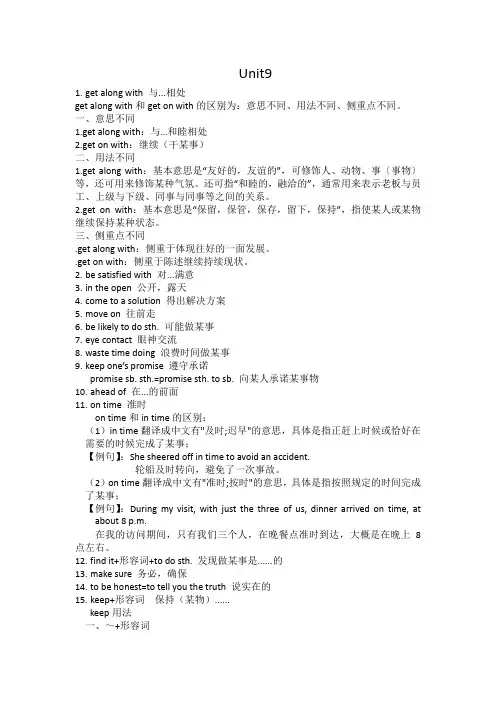
Unit91.get along with 与...相处get along with和get on with的区别为:意思不同、用法不同、侧重点不同。
一、意思不同1.get along with:与…和睦相处2.get on with:继续(干某事)二、用法不同1.get along with:基本意思是“友好的,友谊的”,可修饰人、动物、事〔事物〕等,还可用来修饰某种气氛。
还可指“和睦的,融洽的”,通常用来表示老板与员工、上级与下级、同事与同事等之间的关系。
2.get on with:基本意思是“保留,保管,保存,留下,保持”,指使某人或某物继续保持某种状态。
三、侧重点不同.get along with:侧重于体现往好的一面发展。
.get on with:侧重于陈述继续持续现状。
2.be satisfied with 对...满意3.in the open 公开,露天e to a solution 得出解决方案5.move on 往前走6.be likely to do sth. 可能做某事7.eye contact 眼神交流8.waste time doing 浪费时间做某事9.keep one’s promise 遵守承诺promise sb. sth.=promise sth. to sb. 向某人承诺某事物10.ahead of 在...的前面11.on time 准时on time和in time的区别:(1)in time翻译成中文有"及时;迟早"的意思,具体是指正赶上时候或恰好在需要的时候完成了某事;【例句】:She sheered off in time to avoid an accident.轮船及时转向,避免了一次事故。
(2)on time翻译成中文有"准时;按时"的意思,具体是指按照规定的时间完成了某事;【例句】:During my visit, with just the three of us, dinner arrived on time, at about 8 p.m.在我的访问期间,只有我们三个人,在晚餐点准时到达,大概是在晚上8点左右。

Unit 9I like music that I can dance to.Section A (1a-2d)1.重点单词:prefer,lyrics,Australian,electronic,suppose,smooth,spare,case,director,war2.重点短语:sing along with,dance to,different kinds of,in that case3.重点句式:—What kind of music do you like?—I like music that I can sing along with.Carmen likes musicians who play different kinds of music.I prefer movies that give me something to think about.1.重点短语和句型2.定语从句定语从句一、预习课本P65-66新单词并背诵,完成下面的汉译英。
1.更喜欢________ 2.歌词________3.电子的________ 4.推想________5.平滑的________ 6.空闲________7.情况________ 8.导演________9.战争________ 10.澳大利亚的________二、认真预习1a-2d找出下列短语和句型。
1.随之唱歌________________________________________________________ ________________2.随着……跳舞________________________________________________________ ________________3.不同种类的________________________________________________________ ________________4.既然那样________________________________________________________ ________________5.—你喜欢什么种类的音乐?—我喜欢能跟着唱的音乐。
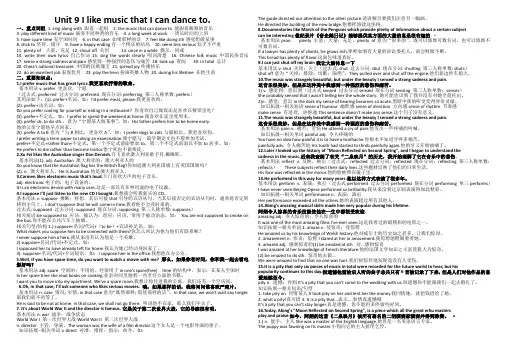
Unit 9 I like music that I can dance to.一、重点词组1. sing along with 跟着一起唱 2. the music that can dance to 能跟着跳舞的音乐3. play different kind of music演奏不同种类的音乐4. a long week at work 一周长时间的上班5. have spare time有空闲时间6. in that case 如果那样的话7. feel like doing sth感觉想做某事8. stick to坚持,固守9. have a happy ending有一个快乐的结局10. seem less serious似乎不严重11. plenty of 大量,充足12. shout off 关闭13. once in a while 偶尔,间或14. write their own lyrics 自己作词15. sing the words clearly 唱词清楚16. Chinese folk music 中国民俗音乐17. sense a strong sadness and pain感觉到一种强烈的悲伤与痛苦18. look up 查阅19. in total 总计20. China’s national treasures 中国的民族瑰宝21. spread joy传播快乐22. do an excellent job表现优异23. play the hero扮演英雄人物24. during his lifetime 在他生前二。
重要知识点:1.I prefer music that has great lyrics.我更喜欢抒情的歌曲。
基本用法v. prefer 更喜欢,宁愿(过去式: preferred 过去分词: preferred 现在分词: preferring 第三人称单数: prefers)其用法如下:(1). prefer+名词。
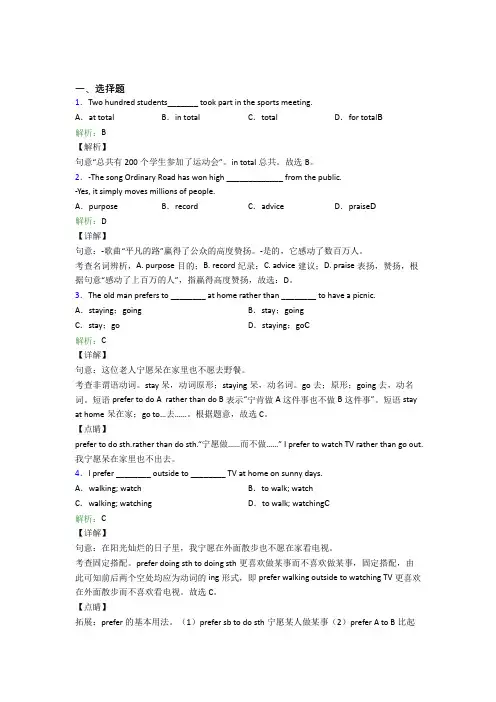
一、选择题1.Two hundred students_______ took part in the sports meeting.A.at total B.in total C.total D.for total B解析:B【解析】句意“总共有200个学生参加了运动会”。
in total总共。
故选B。
2.-The song Ordinary Road has won high _____________ from the public.-Yes, it simply moves millions of people.A.purpose B.record C.advice D.praise D解析:D【详解】句意:-歌曲“平凡的路”赢得了公众的高度赞扬。
-是的,它感动了数百万人。
考查名词辨析,A. purpose目的;B. record纪录;C. advice建议;D. praise表扬,赞扬,根据句意“感动了上百万的人”,指赢得高度赞扬,故选:D。
3.The old man prefers to ________ at home rather than ________ to have a picnic. A.staying;going B.stay;goingC.stay;go D.staying;go C解析:C【详解】句意:这位老人宁愿呆在家里也不愿去野餐。
考查非谓语动词。
stay 呆,动词原形;staying呆,动名词。
go去;原形;going去,动名词。
短语prefer to do A rather than do B表示“宁肯做A这件事也不做B这件事”。
短语stay at home呆在家;go to…去……。
根据题意,故选C。
【点睛】prefer to do sth.rather than do sth.“宁愿做……而不做……” I prefer to watch TV rather than go out.我宁愿呆在家里也不出去。
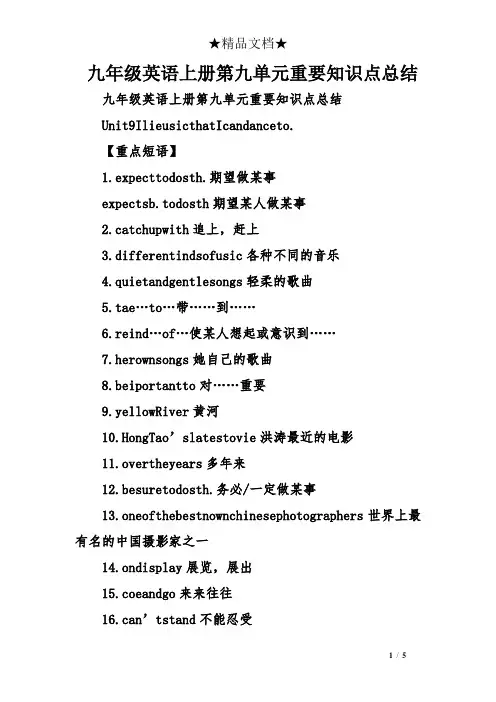
九年级英语上册第九单元重要知识点总结九年级英语上册第九单元重要知识点总结Unit9IlieusicthatIcandanceto.【重点短语】1.expecttodosth.期望做某事expectsb.todosth期望某人做某事2.catchupwith追上,赶上3.differentindsofusic各种不同的音乐4.quietandgentlesongs轻柔的歌曲5.tae…to…带……到……6.reind…of…使某人想起或意识到……7.herownsongs她自己的歌曲8.beiportantto对……重要9.yellowRiver黄河10.HongTao’slatestovie洪涛最近的电影11.overtheyears多年来12.besuretodosth.务必/一定做某事13.oneofthebestnownchinesephotographers世界上最有名的中国摄影家之一14.ondisplay展览,展出15.coeandgo来来往往16.can’tstand不能忍受【重点句型】1.Ilovesingerswhowritetheirownusic.我喜欢自己创作曲子的歌手。
2.Wepreferusicthathasgreatlyrics.我们更喜欢歌词很棒的音乐。
3.WhatdoyoudislieaboutthiscD.你不喜欢这张cD的什么?4.Whatdoesitreindyouof?它使你想起了什么?5.TheusicreindseofBraziliandanceusic.这首曲子使我想起了巴西舞曲。
6.Itdoeshaveafewgoodfeatures,though.然而,它的确也有一些好的方面。
7.Shereallyhassoethingforeveryone.每个人的确都能从她的作品中领悟到一些东西。
8.Whateveryoudo,don’tissthisexhibition.无论怎样,你都不能错过这个展览会。
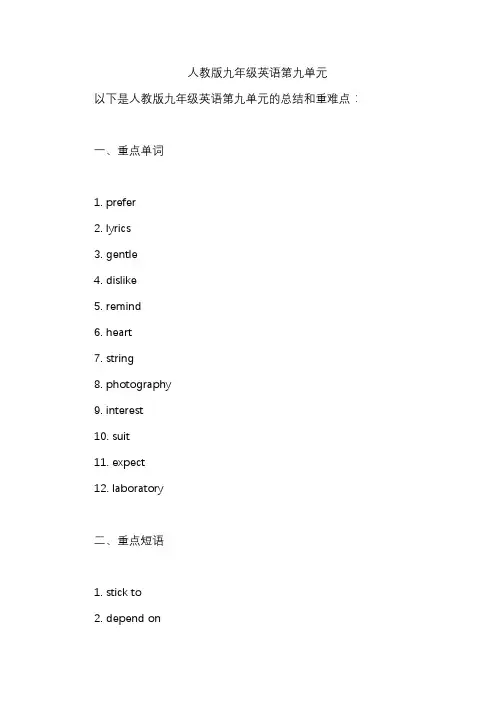
人教版九年级英语第九单元以下是人教版九年级英语第九单元的总结和重难点:一、重点单词1. prefer2. lyrics3. gentle4. dislike5. remind6. heart7. string8. photography9. interest10. suit11. expect12. laboratory二、重点短语1. stick to2. depend on3. cheer up4. plenty of5. shut off6. in that case7. by the way8. in total9. once in a while10. not only...but also...三、重点语法1. 定语从句(Relative Clauses)2. 被动语态(Passive Voice)四、重点句子1. I love music that I can dance to.2. They may not be very popular, but I like them.3. I prefer music that has great lyrics.4. The music reminds me of Brazilian dance music.5. What do you think of this CD?6. It does have a few good features, though.五、重点语法点1. 关系代词引导的定语从句2. 先行词与关系词之间的关系3. 关系代词的省略4. 定语从句与同位语从句的区别六、写作如何写一篇音乐评论。
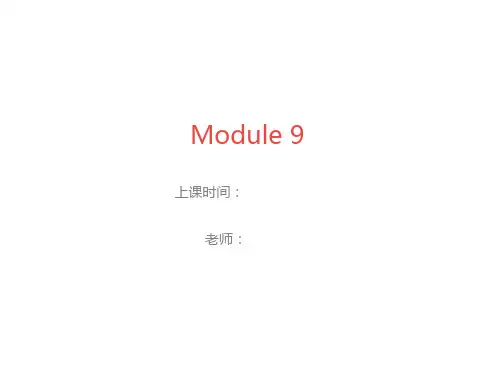
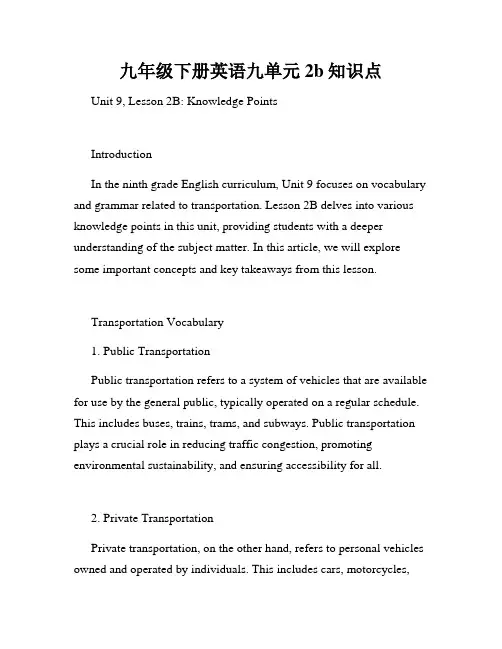
九年级下册英语九单元2b知识点Unit 9, Lesson 2B: Knowledge PointsIntroductionIn the ninth grade English curriculum, Unit 9 focuses on vocabulary and grammar related to transportation. Lesson 2B delves into various knowledge points in this unit, providing students with a deeper understanding of the subject matter. In this article, we will explore some important concepts and key takeaways from this lesson.Transportation Vocabulary1. Public TransportationPublic transportation refers to a system of vehicles that are available for use by the general public, typically operated on a regular schedule. This includes buses, trains, trams, and subways. Public transportation plays a crucial role in reducing traffic congestion, promoting environmental sustainability, and ensuring accessibility for all.2. Private TransportationPrivate transportation, on the other hand, refers to personal vehicles owned and operated by individuals. This includes cars, motorcycles,bicycles, and even walking. While private transportation offers convenience and flexibility, it also contributes to traffic congestion and air pollution.3. Sustainable TransportationSustainable transportation refers to modes of transport that have minimal impact on the environment and promote long-term ecological balance. Examples include electric vehicles, bicycles, and walking. Sustainable transportation aims to reduce carbon emissions and combat climate change.Transportation Trends and Challenges1. Urbanization and Traffic CongestionAs urban areas continue to expand, the demand for transportation increases. Rapid urbanization brings about the challenge of traffic congestion. This problem can be addressed through the expansion of public transportation systems, the promotion of carpooling, and the development of smart city initiatives.2. Alternative Fuels and Electric VehiclesWith the growing concern about environmental issues, there has been a push for alternative fuels and electric vehicles. Governments andcar manufacturers are investing in research and development to make these technologies accessible and affordable. The adoption of electric vehicles can significantly reduce greenhouse gas emissions and dependence on fossil fuels.3. Infrastructural DevelopmentTo accommodate the increasing volume of traffic, the development of transportation infrastructure is vital. This includes building and expanding roads, bridges, airports, and ports. It also involves investing in high-speed rail networks and updating public transportation systems. Such development requires significant funding and careful planning to ensure efficiency and sustainability.Grammar Points1. Comparative and Superlative AdjectivesComparative adjectives are used to compare two things, while superlative adjectives are used to compare more than two things. For example, "bigger" is a comparative adjective, and "biggest" is a superlative adjective. The structure is: adjective + "er" (comparative form) or "est" (superlative form).2. Adverbs of MannerAdverbs of manner describe how an action is performed. They often end in "-ly," such as "quickly," "happily," or "carefully." Adverbs of manner provide additional information about verbs and enhance the description of an action.ConclusionUnit 9, Lesson 2B of the ninth-grade English curriculum introduces students to a range of transportation-related vocabulary and grammar. Understanding the different modes of transportation, transportation trends, and challenges, as well as essential grammar points, will broaden students' knowledge and enable them to communicate effectively in various real-life situations. It is essential to recognize the significance of sustainable transportation and the importance of a well-developed transportation infrastructure in the context of modern society's needs.。
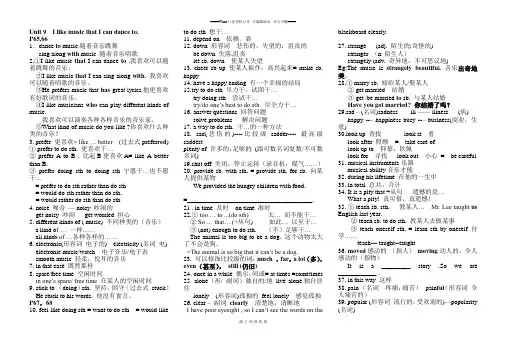
Unit 9 I like music that I can dance to.P65,661.dance to music随着音乐跳舞sing along with music 随着音乐唱歌2.①I like music that I can dance to .我喜欢可以随着跳舞的音乐。
②I like music that I can sing along with. 我喜欢可以随着唱歌的音乐。
③He prefers music that has great lyrics.他更喜欢有好歌词的音乐。
④I like musicians who can play different kinds of music.我喜欢可以演奏各种各样音乐的音乐家。
⑤What kind of music do you like ?你喜欢什么种类的音乐?3. prefer 更喜欢= like … better (过去式prefer red)① prefer to do sth. 更喜欢干…②prefer A to B . 比起B更喜欢A= like A better than B.③prefer doing sth to doing sth 宁愿干…也不愿干…= prefer to do sth rather than do sth= would do sth rather than do sth.= would rather do sth than do sth4. noise 噪音— noisy 吵闹的get noisy 吵闹get worried 担心5. different kind s of ( music) 不同种类的(音乐)a kind o f … 一种……all kind s of …各种各样的……6. electronic(形容词电子的) electricity (名词电) electronic music/watch 电子音乐/电子表smooth music 轻柔,悦耳的音乐7. in that case 既然那样8. spare/free time 空闲时间in one’s spare/ free time 在某人的空闲时间9. stick to (doing)sth. 坚持,固守(过去式stuck)He stuck to his words. 他没有食言。
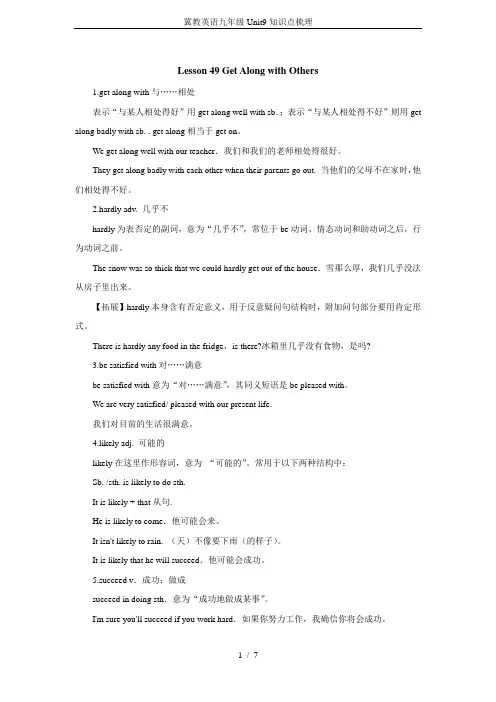
Lesson 49 Get Along with Others1.get along with与……相处表示“与某人相处得好”用get along well with sb.;表示“与某人相处得不好”则用get along badly with sb. . get along相当于get on。
We get along well with our teacher.我们和我们的老师相处得很好。
They get along badly with each other when their parents go out. 当他们的父母不在家时,他们相处得不好。
2.hardly adv. 几乎不hardly为表否定的副词,意为“几乎不”,常位于be动词、情态动词和助动词之后,行为动词之前。
The snow was so thick that we could hardly get out of the house.雪那么厚,我们几乎没法从房子里出来。
【拓展】hardly本身含有否定意义,用于反意疑问句结构时,附加问句部分要用肯定形式。
There is hardly any food in the fridge,is there?冰箱里几乎没有食物,是吗?3.be satisfied with对……满意be satisfied with意为“对……满意”,其同义短语是be pleased with。
We are very satisfied/ pleased with our present life.我们对目前的生活很满意。
4.likely adj. 可能的likely在这里作形容词,意为“可能的”。
常用于以下两种结构中:Sb. /sth. is likely to do sth.It is likely + that从句.He is likely to come.他可能会来。
It isn't likely to rain. (天)不像要下雨(的样子)。
人教版九年级英语第九单元知识点总结Unit 9 I like music that I can dance to.单词Prefer lyrics Australia electronic suppose smooth spare director case in that case war stick Stick to shut shut off down dialog ending documentary dram plenty of superhero sadness pain moving lifetime pity total in total master recall wound painful once in a while intelligent sense. reflect .perform praise一.1. dance to music 随着音乐起舞 2. sing along with 随着……一起唱 3. musicians who play different kinds of music 弹奏不同类型音乐的音乐家 4. electronic music 电子音乐5. not much=nothing much 没什么(事) 6. suppose sb. to do sth. 猜想某人做某事be supposed to do sth. 应该做某事suppose sb (to be) +adj. 原以为某人是……7. have spare time 有空闲时间in one's spare time 在某人的空闲时间spare the time to do sth. 抽时间做……8. think too much 想得太多;过度思考9 in that case 既然那样10. World War II 第二次世界大战11. smooth music 悦耳的音乐12. prefer A to B 比起B来更喜欢A prefer doing A to doing B 愿意去做A而不是去做 B prefer to do A rather than do B 宁愿做A而不做 B 13. feel like doing sth. 想要做某事=want to do sth. =would like to do sth. 14. stick to 坚持,固守15. be down 悲哀,沮丧16. cheer sb up 使…高兴/ 振奋17. have a happy ending 有个美满的结局18. less serious 不那么严重19. a good way to do sth. 做某事的好办法20. shut off 关闭21. in time 及时on time 按时/准时22. once in a while 偶尔的;有时=sometimes /at times 23. write one's own lyrics 自己写歌词24. take sb to sp. 带某人去某地25. Chinese folk music 中国民间音乐26. be played on the erhu 由二胡演奏的27. move sb. 感动某人(sb. be moved by sth.)28.strangely beautiful 异常的/出奇的美29. sense a strong sadness and pain 感觉到一种强烈的伤感和痛苦30. the most moving pieces of music 最令人感动的乐曲31. the city of Shantou = Shantou city 汕头市32. by age 17 到十七岁的时候33. musical ability 音乐才能34. develop a serious illness 得了一种很重的病35. become blind 成了盲人;变瞎36. make money 赚钱37. get married (to sb.) (和某人)结婚38. continue to do sth. 继续去做某事(另一件事)continue doing sth. 继续做着某事(同一件事)39. perform in this way 用这种形式表演40. during/ in one's lifetime 在某人有生之年41. by the end of ... 到……末为止(时间)at the end of ... 在……尽头/末梢(时间、地点)42. It's a pity that ... 遗憾的是……43. in total 总共44. be recorded for the future world to hear 被记录下来供后人聆听45. praise ... for ... 因为……赞美46. China's national treasures 中国的国家珍宝47. paint a picture of ... 描绘了一幅……画48. recall one's deepest wounds 唤起某人最深的伤痛49. painful experiences 痛苦的经历50. a time for spreading joy 传播快乐的时间51. live a very hard life.过着艰苦的生活。
一、选择题1.My arm is still painful, I'm going to see a doctor.A.so B.for C.but D.or A解析:A【解析】句意:我的胳膊仍然很疼,所以我要去看医生。
so因此,所以;for为了,因为;but但是,表示转折;or或者,否则。
根据句意可知,这两句话是因果关系,故应选A。
2.-My mother says that we won't go on a trip to Hong Kong Disneyland. I just can't understand. 一___________You were looking forward to it.A.Never mind. B.Enjoy yourselves!C.What a pity!D.Don't worry about it.C解析:C【详解】句意:我妈妈说我们不去香港迪士尼乐园玩了。
我实在不明白。
——真可惜,你一直盼着呢。
A. 别介意;B. 玩的开心;C. 真可惜;D. 不要担心;本题考查交际用语。
根据“we won’t go on a trip to Hong Kong Disneyland”和“You were looking forward to it.”可知,答话者表示遗憾和同情。
所以选择C。
3.I like the cartoon _____________ has a happy ending and makes me .A.which; to laugh B.that; to laugh C.who; laughing D.which; laugh D解析:D【详解】句意:我喜欢有快乐的结局,让我开怀大笑的动画片。
考查定语从句,此句是含有定语从句的复合句,先行词是cartoon:动画片,表示“物”,引导词用that/which。
make sb do sth:使某人做某事,laugh:大笑,故选:D。
初中九年级英语第九单元知识点总结(完整版)====================第一节语法知识点------------1. 过去进行时- 表示过去某个时刻或某段时间正在进行的动作或事件。
- 结构:主语 + was/were + 动词的ing形式。
- 示例:She was cooking dinner when I arrived.2. 定语从句- 用于修饰一个名词或代词的从句。
- 结构:关系代词/关系副词 + 主句。
- 示例:The book that is on the table is mine.3. 可数名词与不可数名词- 可数名词可以用数字进行计数,不可数名词不能。
- 示例:There are three apples on the table. (可数名词)I need some water. (不可数名词)第二节词汇知识点------------1. 常用的形容词- happy, sad, interesting, boring, beautiful, handsome, kind, friendly, etc.- 示例:She is a beautiful girl.2. 常用的动词短语- get up, go to school, have breakfast/lunch/dinner, study English, play basketball, etc.- 示例:I usually get up at 7 o'clock.3. 常用的副词- slowly, quickly, happily, sadly, well, badly, etc.- 示例:He runs quickly.第三节交际知识点------------1. 表示需要帮助- Can you help me, please?- Is there anyone who can help me?2. 表示感谢- Thank you very much for your help.- I really appreciate your assistance.3. 请求解释- Can you explain it to me, please?- Could you clarify this for me?以上是初中九年级英语第九单元的知识点总结。
人教版初中英语九年级全册各单元知识点、语法归纳整理Unit1 How can we become good learners?一.重点短语1. ask sb. for help 请求某人的帮助be patient 耐心点儿2.improve one’ s speaking skills 提髙某人说的能力3. spoken English=oral English英语口语4. make word cards 制作单词卡片5. listen to tapes 听磁带6. the secret to language learning 语言学习的诀窍7. be afraid to do sth.不敢'做某事8. fall in love with.. . 爱上9. body language 肢体语言10. take notes 记笔记11.make mistakes in grammar 犯语法错误12.learning habits 学习习惯13. have sth. in common 有...共同点14. pay attention to 注意15. connect…with…把....与....联系起来16. write down key words 摘抄重点词17. in class 在课堂上after class 课后18. be interested in… 对.......感兴趣19. do sth. on one’s own 独立做某事20. worry about 为...而担忧21. depend on=rely on 依赖;取决于二.重点句型1. What about doing sth ?例:What about listening to tapes?2.by的用法a. 介词 prep. (指交通等)乘;例:The man came by bus. 那人是坐公共汽车来的。
Unit 9 知识点总结Unit Nine Section A No 11.有极好的歌词have great lyrics2.随着音乐跳舞dance to music3.随着唱sing along with4.更喜欢某物(两种)prefer sth =like sth better5.比起做某事更喜欢做某事prefer to do sth rather than do sth =prefer doing to doing sth6.做某事怎么样?what about doing sth7.一个澳大利亚歌手an Australian singer8.弹奏不同种类的音乐play different kinds of music9.喜欢电子音乐like electronic music10.播放安静缓慢的音乐play quiet and slow songs11.太吵too noisy12.我最喜欢的乐队my favorite band句子:1.你喜欢哪种音乐?What kind of music do you like ?2.我喜欢我能随着唱的音乐。
I like music that I can sing along with3.我更喜欢有极好歌词的音乐。
I prefer music that has great lyrics .4.我喜欢我能随着跳的音乐。
I like music that I can dance toUnit Nine Section A No 21.应该做某事be supposed to do sth2.听起来悦耳的sound smooth3.帮我放松help me relax4.想要看电影(三种)want to watch a movie = feel like watching a movie =would like to watch a movie5.在我的空闲时间(两种)in my spare time = in my free time6.一个著名的导演a famous director7.取决,依靠depend on8.想地太多think too much9.既然那样in that case10.让我深思的事give me something to think about11.坚持stick to句子:1.我想我只会听我买的这张新唱片。
人教版九年级英语unit9知识点人教版九年级英语unit9知识1知识梳理【重点】danceto(music)随着(音乐)跳舞singalongwith随着…一起唱musicianswhoplaydifferentkindsofmusic弹奏不同类型音乐的音乐家electronicmusic电子音乐notmuch没什么(事)supposesbtodosth.猜想某人做某事besupposedtodosth应该做某事supposesb(tobe)+adj.原以为…havesparetime有空闲时间inone’ssparetime在某人的空闲时间sparethetimetodosth抽时间做…afilmdirector一名电影导演thinktoomuch想太多inthatcase既然那样WorldWarII第二次世界大战smoothmusic悦耳的音乐preferAtoB比起B来更喜欢ApreferdoingAtodoingBprefertodosth.ratherthandosth.20.feellikedoingsth想要做某事stickto坚持,固守bedown悲哀,沮丧cheersbup使…高兴/振奋haveahappyending有个美满的结局tryone’sbesttodosth.尽某人最大努力做…lessserious不那么严重agoodwaytodosth做某事的好办法makemefeelevensadder让我感觉更伤心provideplentyofinformationaboutacertainsubject提供了大量的关于某个主题的信息shutoffmybrain关闭我的大脑【重点句型】1.Ilovesingerswhowritetheirownmusic.我喜欢自己创作曲子的歌手。
Weprefermusicthathasgreatlyrics.我们更喜欢歌词很棒的曲子。
WhatdoyoudislikeaboutthisCD.你不喜欢这张CD的什么?Whatdoesitremindyouof?它使你想起了什么?ThemusicremindsmeofBraziliandancemusic.这首曲子使我想起了巴西舞曲。
九年级英语第九单元知识点
Unit 9
1.be used for 用来做…
2.be used by 被…使用
3.be used in 被用于…场合
4.be used as 被用作…
5.light bulb 电灯泡
6.microwave oven 微波炉
7.by mistake 错误地8.by accident 偶然地
9.according to 根据,按照10.fall into 落入,陷入
11.in this way 这样12.knock into 与…相撞
13.make sb. happy 使某人愉快14.do wrong 做错,作恶,犯罪
15.boil water 烧开水16.boil with fury 激怒
17.be on fire 着火了18.a rose bush 玫瑰花丛
19.thousamds of 许许多多,成千的20.thousands of times 几千遍,无数次,千万倍
21.the ancients 古代民族22.shoot at 射击
23.the number of “…的总数,数量”24.A number of “许多…”
25.fall down (从高处)落下26.fall off从(自行车.卡车.摩托车等)上面掉下来
27.fall over 摔趴下28.some time 一段时间
29.some times 几次/倍30.at the end of 在…的最后,在…的末尾
31.by the end of 到…末为止32.by accident=by chance 偶然的,无意中
33.take part in 参(转载自中国教师站文摘,请保留此标记。
)加,参与34.hang from 悬挂,吊着
35.It is believed 人们说,据说36.since then 从那时起(到现在)
37.prefer to更喜欢38.divide into 分成,分为
39.alarm clock 闹钟40.not…until 直到…才…
二.重点句子
Unit 9
When was the car invented?小汽车是什么时候被发明的?
When were electric slippers invented?电子拖鞋是什么时候被发明的?
Who were they invented by?他们是被谁发明的?
What are they used for?他们被用来做什么?
三.重点句型,句式
Unit 9
1.被动语态:它是由“was/were+动语“过去分词”构成的。
”
2.be used for:意思是“被用来做什么”,强调用途或作用.
3.be used as :意思是“被作为什么来用”,强调被当作工具或手段来用.
4.be used by:意思是“被谁使用”,强调使用者.
5.“名词+现在分词/过去分词”构成一个合成形容词,在句中作定语和表语。
6.插入语:当一个词、短语或从句用在句里,而与句子的其他成分没有语法上的关系时,它就是句子的独立成分。
插入语就是这种独立成分之一。
插入语一般对一句话做一些附加的解释,放在句末时,通常在前面加逗号,放在句中时,有时在前后加逗号,有时不加任何标点符号。
7.according to+名词意思是按照、依照……所说,随着……的不同而不同
8.according as +从句,意思是根据……而……,按照……而……
※9.prefer to do sth.“更喜欢去做某事”
Prefer 意思是更喜欢,常可与like better ,instead of 进行替换,它所组成的常见句式有:Prefer A to B“比起B来更喜欢A”,prefer doing A to doing B“比起干B这件事来,更喜欢干A这件事”,perfer to do A rather than do B“宁愿做A而不原做B.”。